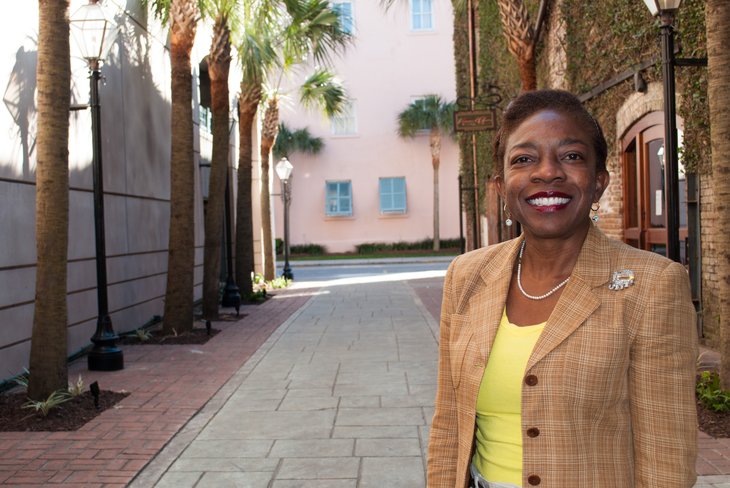Posted in: Public

Education, equality and engagement. Debra Gammons repeated these three words in her speech at the Charleston County Bar Association Annual Meeting. Gammons, who was installed as president of the Charleston Bar in February, is the first black person to lead the organization.
Gammons graduated from the University of South Carolina School of Law in 1992, and during her time she was active in leadership roles, volunteer work and was dedicated to her studies. She knew from a young age she wanted to be a lawyer. Her inspiration came from watching “Perry Mason” on television.
Currently serving as the director of the Office of Diversity and a distinguished professor at the Charleston School of Law, Gammons thanks those who paved the road for her. She’s grateful for her family who planted core values in her at a young age. Her professors and friends throughout undergrad and law school inspired her and helped her be her very best.
As her term begins, Gammons took the time to discuss her vision and plans for the Charleston Bar and what she believes diversity in the legal field will look like in the future.
What plans do you have in mind for the Charleston Bar?
The theme this year is “Education, Equality, Engagement.” My plans include working with the executive committee and other members of the Charleston Bar to make the Charleston Bar more visible and energetic! I plan to have members engage in community outreach and work with schools and the public to teach about the law; to encourage children and adults to learn about our Constitution. Education is the key to a strong society. Education gives people options and opportunities. Education reduces crime. Working out in the community brings about positive changes. Equality for all is crucial; treating people fairly is the foundation of our Constitution and the foundation of a strong community. Engaging the members of the Charleston Bar to work together and to work in the community will allow us to achieve the goals of improving education and strengthening equality for all.
What does being president mean to you?
Being president of the Charleston Bar means responsibility and representation. As a true representative of attorneys, I am responsible for offering everyone a seat at the table. I am grateful for the Charleston Bar, the executive committee, and the nominating committee for allowing me to serve in this position. To be the first black person, to be the first brown person as president of the Charleston Bar is humbling. To be only the sixth female also gives me pause. I am grateful for all the pioneers who carved a path before me, who allowed me to stand on their shoulders, in order to be president of the Charleston Bar. Being president means that I must continue to be welcoming, civil, respectful, and fair.
Can you explain the importance of local bar associations?
Getting involved in local bar associations increases the ability for attorneys to get to know one another; to share common interests and work on issues that better society; and allows for interactions free of the stress of the courtroom.
Why did you get involved in the Charleston Bar?
I got involved with the Charleston Bar because I find it is my duty to help my local bar as well as the Big Bar by getting involved. Working on committees that increase the community’s understanding about laws and the role of attorneys, to bring about positive changes. We are not able to complain if we are not working toward solutions.
What would you tell a young lawyer who is considering getting involved in her/his local bar?
I would and do tell young lawyers, “Get involved.” Volunteer. The local bars need you to help. Your helping strengthens the legal profession. Your helping puts you in touch with experienced attorneys who are willing to help you and mentor you. Your helping fulfills your duty as a public citizen seeking to improve the administration of justice and education about the law.
How do you feel about diversity in the legal field?
Diversity in the legal arena is important. Diversity encompasses sex, ethnicity, skin color, gender, age, economics, and geographical background. Our society is diverse. Attorneys need to be able to represent clients with backgrounds different from their own. Clients and the general public find assurance in a system that has a reflection of who they are. This assurance gives them a sense of confidence in our legal system. They were treated fairly by judges and others in the legal system and by the laws of our state and country; they were not treated a certain way because of the color of their skin, their sex, or their accent.
Diversity in the legal arena is important because we still deal with stereotypes – especially those about females. Today, some female attorneys are told they need to wear skirts to court; they need to wear pantyhose to court. Today, some female attorneys are invisible in meetings; what they say is dismissed or “not heard.” Increasing diversity in the legal profession will increase productivity and equality.
What do you love most about your job?
I love meeting and interacting with people. I love helping people. I love discussing the law and engaging people to work for equality and positive change.
What’s the hardest part of your job?
The most difficult or frustrating aspect of being president is not being able to reach everyone and engage 100 percent of members in achieving the goals of education and equality.
